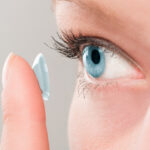Cancer WARNING: Recent research reveals startling truth about your contact lenses
 (NaturalHealth365) In an era where screens dominate our lives, our eyesight pays the price. Parents, children, and teens spend countless hours glued to screens, resulting in dreaded nearsightedness or myopia. Seeking respite, many turn to contact lenses as a miraculous solution. Colored contact lenses, in particular, offer the allure of both restored vision and enhanced aesthetics.
(NaturalHealth365) In an era where screens dominate our lives, our eyesight pays the price. Parents, children, and teens spend countless hours glued to screens, resulting in dreaded nearsightedness or myopia. Seeking respite, many turn to contact lenses as a miraculous solution. Colored contact lenses, in particular, offer the allure of both restored vision and enhanced aesthetics.
But before you dive into the world of contact lenses, beware of the unsettling truths that lurk beneath the surface. Startling reports have emerged, revealing the presence of toxic chemicals in these seemingly innocent ocular companions. The implications are grave, as these chemicals are suspected of posing a cancer risk.
Exposing the cancer-causing threat of forever chemicals in contact lenses
In a revelation that has sent shockwaves through the optical world, a recent study revealed a dark secret about the contact lenses many Americans rely on for clear vision. Many of the contact lenses on the market today harbor hazardous poly-fluoroalkyl substances (PFAS), commonly called “forever chemicals.”
The implications of this discovery are nothing short of alarming. Research has linked PFAS to a range of severe health issues, including cancer, fertility problems, autoimmune disorders, and even damage to internal organs. It’s a chilling reality that demands our attention.
The study that ignited this concern highlights a disturbing fact: nearly 20 popular contact lens brands in the United States contain alarming levels of fluorine, an indicator of PFAS presence. Shockingly, these chemicals are intentionally used to coat contact lenses and other products, purportedly to repel water and prevent staining. However, their true nature is far more insidious.
The truth is that PFAS are indelible, persisting indefinitely instead of naturally breaking down. As a result, they create an unseen danger that lingers long after we insert those lenses into our eyes. It’s a sobering reminder that our pursuit of clear vision comes at a potentially devastating cost.
Discover a Simple and Effective Way to Remove Toxins: This is Jonathan's #1 choice for at-home detoxification. Special offer ends Feb. 16.
Do your contact lenses increase your cancer risk?
The public health blogs Mamavation and Environmental Health News financed the contact lens study. Scientists studied the contact lenses made by Coopervision, Alcon, and Acuvue, finding organic fluorine in each. The analysis seems legitimate as it was conducted at a lab approved by the Environmental Protection Agency (EPA).
The test identified forever chemicals at concerningly high levels, between 20,700 and 105 parts per million. The analysis indicates the majority of contact lenses made by these companies are laden with fluoropolymer PFAS.
It must be noted that the study focused on soft disposable lenses as opposed to those of the hard variety. The study showed all lenses were laden with in excess of 100 PFAS parts per million, representing a 50K multiple of the level allowed for what the EPA deems to be safe in drinking water for human consumption.
Embrace options aside from contact lenses
Instead of paying exorbitant sums of money for disposable contacts, suffocating your eyes of essential oxygen, and potentially developing cancer, take the safer and healthier route. Choose traditional eyewear in the form of old-fashioned glasses, and you’ll see clearly without worrying about cancer-causing forever chemicals seeping into your eyes.
Lasik eye surgery is also an option, yet we would be remiss to endorse the procedure as it is a relatively new scientific advancement. Aside from the potential permanent loss of vision, there is also a chance for future eyesight regression after Lasik surgery. Of course, we should also mention the importance of eating well to protect your vision.
Bottom line: put your health first; choose eyeglasses – if you need help, and you’ll see the world clearly without jeopardizing your health.
Sources for this article include:



